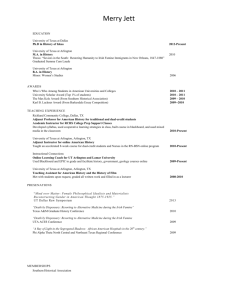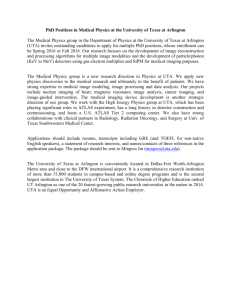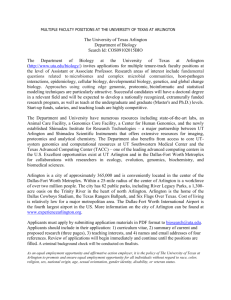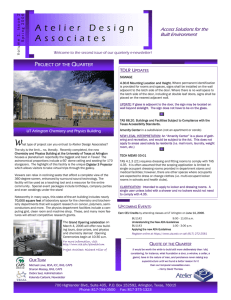FACILITIES - The University of Texas at Arlington
advertisement
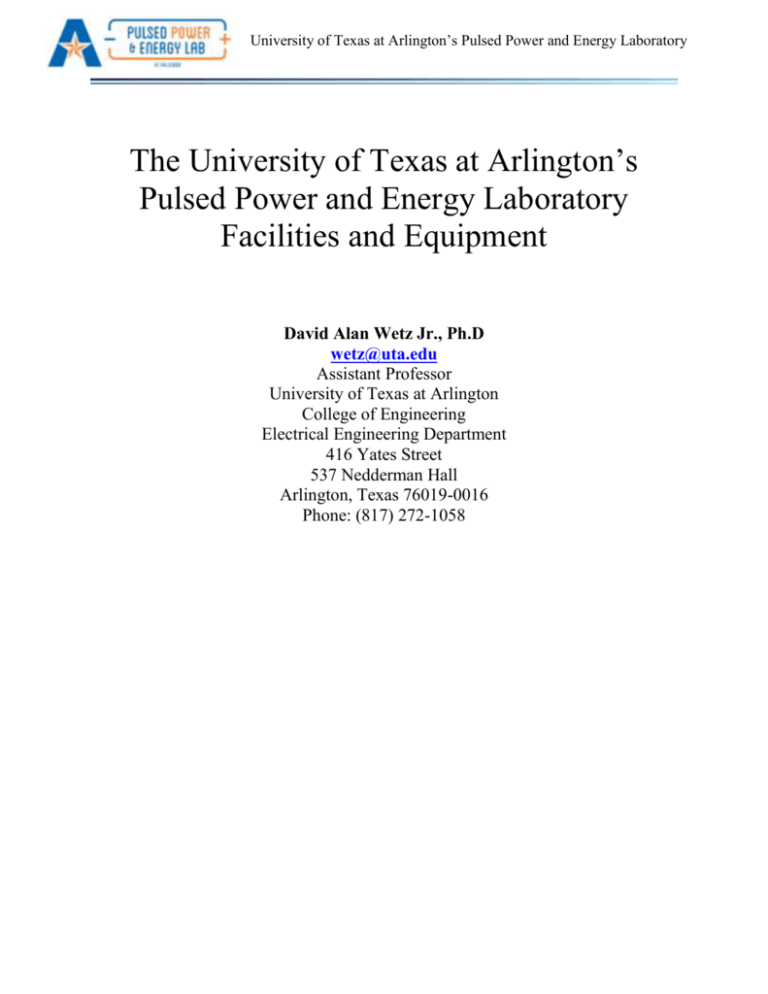
University of Texas at Arlington’s Pulsed Power and Energy Laboratory The University of Texas at Arlington’s Pulsed Power and Energy Laboratory Facilities and Equipment David Alan Wetz Jr., Ph.D wetz@uta.edu Assistant Professor University of Texas at Arlington College of Engineering Electrical Engineering Department 416 Yates Street 537 Nedderman Hall Arlington, Texas 76019-0016 Phone: (817) 272-1058 University of Texas at Arlington’s Pulsed Power and Energy Laboratory UT Arlington The University of Texas at Arlington sets the standard for educational excellence in the thriving Dallas-Fort Worth area. With an enrollment approaching 36,000, it's the second largest institution in the UT System and the sixth largest in Texas. The University is rising in stature through its commitment to transforming the lives of students, pushing the boundaries of knowledge, and serving those around us. PPEL Laboratory Space Directed by PI Wetz in the Department of Electrical Engineering, University of Texas at Arlington. This 5000 sq ft laboratory is located in Engineering Laboratory Building (ELB) rooms 124 and 126. University of Texas at Arlington’s Pulsed Power and Energy Laboratory Personnel Computers In the PPEL, there are 9 Dell and 1 HP computers available. All computers are installed with Windows 7, MATLAB, MS Office, PSPICE, Matlab®, LabVIEW, Adobe 10.0, etc. Data Acquisition 1 – FLIR SC8000 HS series IR thermal imaging camera (seen below) o 1024 x 1024 HD resolution o 3.0 – 5.0 μm or 1.5 – 5.0 μm spectral range o 132 Hz full window frame rate 2 - FLIR A325sc IR thermal imaging cameras (seen below) o 320 x 240 HD resolution o 7.5 – 13.0 μm spectral range o 13 Hz full window frame rate University of Texas at Arlington’s Pulsed Power and Energy Laboratory 1 – Vision Research, v7.3 Phantom High Speed Camera o 14 bit resolution o 6,688 fps at full resolution speed o Up to 222,222 fps (standard mode) o 500,000 fps (turbo mode) reduced resolution speed o Full frame 4:3 aspect ratio CMOS sensor composed of 800 x 600 pixels 3 – 9 slot National Instruments PXI chassis (1 shown below) o 4 – NI PXI-5105 cards each of which has 8-ch, 12 bit, 60 MS/s digitizers w/ 128 MB of onboard memory o 10 – NI PXI-6361 c NI PXIe-6361, X Series Multifunction DAQ (16 - 16 bit AI, 24 DIO, 2 AO), 2 MS/s single-channel sampling rate o 2 - NI PXIe-6368, X Series Multifunction DAQ (16 – 16 bit simultaneous AI, 48 DIO, 4 AO), 2 MS/s/ch sampling rate 1 – National Instruments (NI) 6 slot PXI chassis with over 50 channels of data acquisition measurement channels University of Texas at Arlington’s Pulsed Power and Energy Laboratory o 2 – NI PXI-5105 cards each of which has 8-ch, 12 bit, 60 MS/s digitizers w/ 128 MB of onboard memory 6 – 8 slot National Instruments CompactDAQ chassis 4 – 4 slot National Instruments CompactDAQ chassis 1 – 8 slot National Instruments CompactRIO chassis 15 – 32 channel National Instruments 9205 voltage acquisition cards 32 – 16 channel National Instruments 9213 thermocouple data acquisition modules (75 S/second sampling capability on up to 16 channels) Multiple other National Instruments data acquisition and control cards for CompactDAQ and PXI chassis 2 – LeCroy four channel digital oscilloscopes with a sampling rate of 2.5 Gigasamples/s 1 – LeCroy two channel digital oscilloscope with a sampling rate of 200 MHz 2 – Rigol four channel digital oscilloscopes with sampling rates of 100 MHz 1 – Dataq DI-158U four channel data logger with measurement ratings up to 10 V at 12 bit resolution 1 – NI USB 6211 – 16 Channel, 250 kS/s data acquisition system Various high current (few hundred A) and high voltage (up to 20 kV) probes diagnostics Energy Storage Devices or Modules 1 – 1000 V, 200 Ah, C&D Technologies Valve Regulated Lead Acid (VRLA) battery 1 – 1000 V, 30 Ah, Saft VL30 LFP battery module 1 – 60 V, 200 Ah C&D Technologies VRLA battery 1 – 60 V, 100 Ah G4 Synergetics Bipolar Nickel Metal Hydride Battery 1 – 35 V, 20 Ah GAIA LFP lithium-ion battery (10S/1P) 6 – 35 V, 30 Ah Saft LFP lithium-ion battery modules (each one is 10S/1P) 1 – 31 V, 225 F JM Energy lithium-ion capacitor modules (8S/1P) 1 – 48 V, 83 F Maxwell EDLC module 2 – 16 V, 150 F Maxwell EDLC modules 2 – 32 V, 9 Ah, K2 Energy LFP lithium-ion battery modules A few of each type of the following lithium-ion batteries, lithium-ion capacitors, or EDLCs: o Saft VL22V, Saft VL5U, Saft VL3-LTO, Saft VL10VFe, Saft 34P, Saft 30PFe, GAIA 27 Ah, GAIA 18 Ah, Maxwell 2000 F Supercapacitors, K2 LPF26650, A123 26650, and A123 18700 cells University of Texas at Arlington’s Pulsed Power and Energy Laboratory DC Power Supplies 7 – Ametek 80 V/188 A/15 kW DC power supplies 2 – Chroma 100 V/ 100 A/ 5 kW DC power supplies 3 – Ametek 300 V / 13 A/ 3.9 kW DC power supplies 1 – Ametek 40 V/ 75 A/ 3 kW DC power supply 2 – Ametek 20 V/ 80 A/ 1.6 kW DC power supplies 2 – Ametek 60 V/ 28 A/ 1.6 kW DC power supplies 1 – MagnaPower 350 V/ 13.5 A/ 4.7 kW DC power supply 2 – Xantrex 33 V/ 33 A/ 1 kW DC power supplies 1 – Xantrex 600 V/ 13 A/ 7.8 kW DC power supply 3 – 5 V/ 100 A DC power supplies 2 – 4 channel DC power supplies with ratings of 35 V and 4.5 A per channnel 1 – Glassman 30 kV/ 10 mA DC power supply 1 – Glassman 20 kV/ 100 mA DC power supply Electrochemical Cell Cyclers 1 – Custom built, constant resistance load capable of loading energy storage cells/modules at currents as high as 8 kA. Devices recharged using DC power supplies listed above 1 – 7 channel MACCOR 4000 series battery cycler system (seen below) o 5 – 5V channels, each with 240 A current capability o 2 – 60 V channels each with 100 A current capabilities o Each channel has both programmable load and supply capability at these rates on each channel 1 – Espec BTZ 133 environmental chamber (-70oC to 180oC) with connectivity to the MACCOR System (seen below) 1 – Espec BTX 433 environmental chamber (-70oC to 180oC) with humidty control and connectivity to the MACCOR System (seen below) University of Texas at Arlington’s Pulsed Power and Energy Laboratory 9 – 80 V / 1000 A / 15.6 kW Chroma 63209 DC programmable loads (1 shown below) o Parallelable to achieve higher power rate at up to 80 V o DC power supplies listed above are used as recharge units and all are configured as stand-alone cycler channels with fully automated National Instruments based control and data acquisition 1 – 500 kW / 1200 V / 700 A Chroma 17030 Regenerative battery test System o Charge and discharge capable at the rates listed above University of Texas at Arlington’s Pulsed Power and Energy Laboratory 1 – Chroma 4 ch, 6314 Programmable load chassis o 1 – 6A/60A, 16V/80V, 300W 63103 DC Electronic load o 1 – 1A/10A, 125V/500V, 300W 63105 DC Electronic Load 1 – Chroma 2 ch, 6312A Programmable load chassis o 1 – 6A/60A, 16V/80V, 300W 63103A DC Electronic load 3 – Chroma 350 AC/DC V/ 35A / 3600 W Programmable loads Potentiostats 1 - MetrOhm ParStat 302N Potentiostat/FRA with ratings up to 60 V and 20 A using 20 A booster Princeton Applied Research PARSTAT 4000 Potentiostat with 20 A booster University of Texas at Arlington’s Pulsed Power and Energy Laboratory Princeton Applied Research VersaSTAT 4 with 20 A booster capability Hybrid Energy Storage Module (HESM) 1 – Custom developed Hybrid Energy Storage Module (HESM) which actively controls the integration of high energy batteries with high power capacitors Power Electronics 4 – ABB 5SNA 2400E170100 – 1700V, 2400 A IGBT’s University of Texas at Arlington’s Pulsed Power and Energy Laboratory Multiple other 1700 V – IGBTs, 1.7 kV diodes, etc. Magnetics 1 – 1 T DC electromagnet (seen below) Water Chillers and Air Cooling 1 – 2.5 kW Neslab - Merlin water chiller with cooling down to -20 deg C (1 seen below) 3 – 2.9 kW PolyScience water chillers with cooling down to -20 deg C (1 seen below) University of Texas at Arlington’s Pulsed Power and Energy Laboratory 1 – 20 hp, 1000 CFM air blower 1 – 10 kW liquid cooled heat exchanger University of Texas at Arlington’s Pulsed Power and Energy Laboratory Pulsed Power 1 – Small caliber (1” x 0.5” bore) electromagnetic launcher with a length of 1 m long o 1 – 400 V, 430 mF, 100 kA capacitive power supply (seen below) 1 – 22 kV, 4 mF, 1 MJ capacitive pulsed power supply capable of supplying 200 kA of current into low impedance loads (seen below) o 1 – Small caliber (1” x 1” bore) electromagnetic launcher with a length of 2 m University of Texas at Arlington’s Pulsed Power and Energy Laboratory Rotating Machines 2 – 1 kW motor/generator with custom DC excitation and 3 phase 120 VAC output University of Texas at Arlington’s Pulsed Power and Energy Laboratory Machining Capabilities 1 – Bridgeport milling machine 1 – Clausing lathe 1 – Circular chop saw, 1 – Vertical band saw, 1 – Horizontal band saw, 1 – Drill press, 1 – Vertical and rotary sander, 1 – Table saw, and various standard tools Access to UT Arlington’s Physics Dept. and Mechanical Engineering Machine Shops with full CNC and Wire EDM machining capability University of Texas at Arlington’s Pulsed Power and Energy Laboratory Materials Characterization Capabilities Full access to the UT Arlington Materials Science and Engineering Department’s Characterization Center for Materials and Biology (CCMB) $1000 per semester for unlimited access (http://ccmb.uta.edu/) o The 3450 square feet centralized facility, managed by the UTA MSE Department, houses multi-user, major materials research instruments, and is open to the entire UTA materials research community, as well as researchers from other Institutions and industries. Instruments include: Xray Photoelectron Spectroscope (XPS) and Auger Electron Microscope, Scanning Electron Microscopes (SEMs) and Transmission Electron Microscopes (TEMs), Atomic Force Microscope (AFM), X-ray diffractometers, Hysitron Nano Indenter/Scratch, Thermal Analysis Systems, FTIR Spectrometer, Raman Microscope and TEM sample preparation facilities. Full access to the UT Arlington Physics Department’s Shimadzu Institute $1000 per semester for unlimited access (http://www.uta.edu/sirt/scaac/ ) o The laboratory was established in 2012 due to the generous support of Shimadzu Scientific Instruments and the University of Texas at Arlington. The $6 million mass spectrometry and analytical chemistry research center includes a large number of mass spectrometers, as well as state-of-the-art supporting peripheries (e.g. chromatograpy and sample preparation) and other spectroscopy instrumentation. MicroGrid Laboratory Space Directed by PIs Wetz and Lee, in the Department of Electrical Engineering, University of Texas at Arlington. This Lab is located in ELB 219, with more than 800 square feet. University of Texas at Arlington’s Pulsed Power and Energy Laboratory Major Equipment 2 Dell workstation running MS OFFICE and NI LabVIEW 4 – 300 W vertical axis wind turbines with MPPT 24 VDC controllers (seen below) 12 – 230 W solar panels with MPPT 24 VDC controllers (seen below) 1 – 1.2 kW Proton Exchange Membrane Fuel Cell 3 – Chroma 350 AC/DC V/ 35A / 3600 W Programmable loads 2 – 1.4 kW Outback 24VDC to 120V/60Hz AC inverters 1 – 2.5 kW Outback 24VDC to 120V/60Hz AC inverter University of Texas at Arlington’s Pulsed Power and Energy Laboratory 1 – 4 kW Xantrex 24VDC to 120V/60Hz AC inverter 3 – National Instruments CompactRIO digital controller systems o 54 Channels of analog input measurement o 96 Channels of digital output o 96 Channels of analog output o 96 Channels of digital input Real time voltage and current monitoring diagnostics 3 – 25 VDC, 100 Ah lead acid energy storage modules Low impedance disk resistive load The equipment above is all installed in as an easily reconfigurable MicroGrid testbed on which advanced energy storage cells/modules can be experimentally validated.
